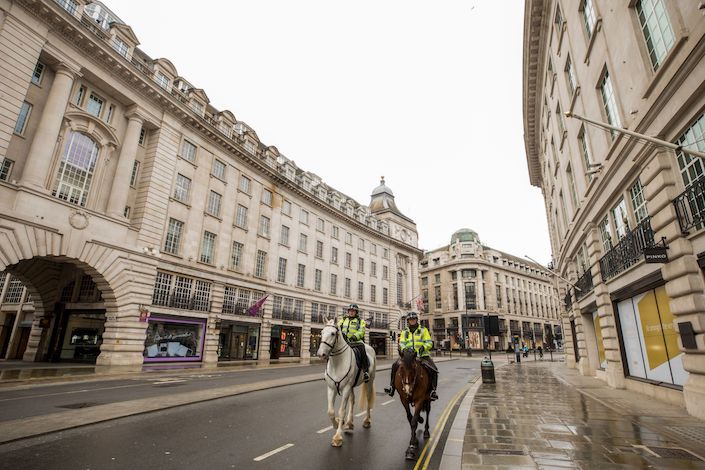U.K. Bets on Less-Reliable Form of Covid-19 Test in Scramble to Stop Pandemic

 |
Timely and extensive testing has proved to be the key to stopping the rapid spread of coronavirus. That’s the hard lesson the U.K. has learned.
The U.K. government last month set a target of carrying out 25,000 tests a day, but it appears that goal will not be met until the end of April because of limited labs and testing sites. More than 8,000 people were tested Monday, far below the goal.
As of 9 a.m. April 1, 152,979 people had been tested. Of them, 29,474 were confirmed positive for the Covid-19 virus. As of Tuesday, 2,352 have died in the country, the sixth-highest death toll in the world.
A “critical constraint” on the ability to increase testing capacity was the availability of the chemicals needed to test patients, Cabinet Office minister Michael Gove said.
There are two types of test for Covid-19: nucleic acid test (NAT) and antibody test. The NAT technique is highly sensitive and specific for detecting the presence of the virus so that it can quickly identify infected people. The antibody test analyzes drops of blood for antibodies to show whether someone has already had the virus. Antibody tests typically do not become positive for a week or so after the beginning of an illness, so they are not much use for quick diagnoses. But antibody tests are simpler than NAT tests with lower requirements for lab conditions.
Unlike other countries such as China, the U.S. and South Korea, the U.K. hasn’t commonly used NAT tests. At the moment, most of the NAT tests are reserved for seriously ill patients in hospitals. People with mild symptoms can’t get tested.
The government has been criticized for delay in providing mass testing. While the World Health Organization (WHO) called March 16 on countries to “test, test, test,” the U.K. has been following a four-stage strategy for fighting the disease: containment, delay, mitigation and research. On March 12, the prime minister announced a change of strategy, moving to delay the spread of the virus rather than contain it, which basically means allowing most people be infected and develop antibodies against the disease, creating so-called “herd immunity.”
A model built by London’s Imperial College infectious disease professor Neil Ferguson predicts that 250,000 British people could die from the pandemic unless stringent measures are taken. His research is said to have persuaded Prime Minister Boris Johnson to change the virus-fighting strategy. The Imperial College’s model estimates that 2.7% of the British population had been infected as of March 28, meaning about 1.8 million people need to be tested.
Now that the government decided to roll out mass testing, the shift may be too late, many say, including Richard Horton, the editor-in-chief of The Lancet medical journal.
Horton wrote in the journal that the government’s contain-delay-mitigate-research plan failed because the government didn’t follow the WHO’s advice to “test, test, test” every suspected case, didn’t isolate and quarantine and didn’t trace patients’ contacts.
“We have lost valuable time,” he said. “There will be deaths that were preventable. The system failed.”
As the government previously made no preparations to increase manufacturing of test kits or expand laboratory capacity, now the U.K. finds it extremely difficult to import test kits as every country is searching for the products.
Instead, the U.K. is pinning its hopes on the antibody testing approach. It has ordered 3.5 million antibody test kits and is ordering a million more. Prime Minister Johnson, who himself tested positive through a NAT test, said the tests will be a “game changer,” determining whether people who may have had the virus are safe to go back to work, but doubts have been raised on the accuracy and effectiveness of the tests.
Read more
Caixin’s coverage of the new coronavirus
The U.K. scientific community has called for rapid antibody testing to be made available to medical and essential workers so that those who have recovered can to go back to work.
Within days, anyone can order such test kits from Amazon.com and pharmacy stores and test themselves at home, Sharon Peacock, director of the U.K.’s National Infection Service, said March 25.
If the roll-out goes ahead as planned, the U.K. will be the first to implement at-home testing on this scale, but the accuracy of the tests has yet to be established. Researchers caution that properly validating the accuracy of such tests and manufacturing them in large quantities present significant challenges.
A positive antibody test indicates someone contracted the virus but does not necessarily mean the subject has recovered and won’t infect others, several experts told Caixin.
Using antibody testing as the single standard for resuming work is not ideal, said Feng Zhenqing, a researcher at the antibody technique lab of Nanjing Medical University. The safest way is double-check using a NAT test, Feng said.
Robert Garry, a virologist at Tulane University School of Medicine in New Orleans, said he expects the false-positive rate of antibody tests to be very high because the blood tests need to distinguish between antibodies against the Covid-19 virus and those against other seasonal coronaviruses to which people are commonly exposed.
Contact reporter Denise Jia (huijuanjia@caixin.com) and editor Bob Simison (bobsimison@caixin.com)





